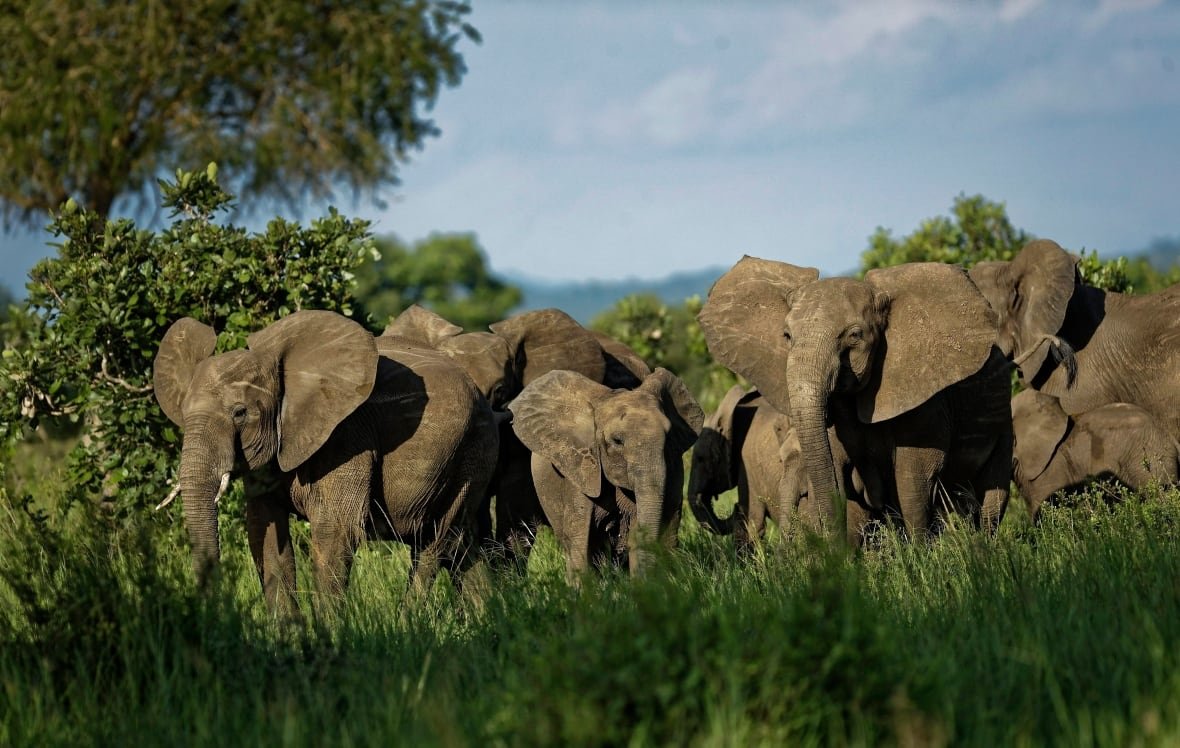
Mkhaya, a seven-year-old elephant at the San Diego Zoo Safari Park, can rest easy knowing her family has her back.
When a 5.2-magnitude earthquake struck the area on Monday, Mkhaya’s herd wasted no time forming a protective barrier around her, known as an “alert circle.”
The phenomenon, captured on video, has zoo staff beaming about the African elephant herd’s sharp instincts, effective communication skills and strong family connection.
“For them to be engaged in their environment and pick up on the signals that they’re getting and respond appropriately, it’s remarkable to see,” Mindy Albright, curator of mammals at the Escondido, Calif., facility, told As It Happens host Nil Köksal.
“And it’s remarkable to see that those family bonds are so strong that they come together immediately to care for one another.”
When a 5.2-magnitude earthquake struck San Diego on Monday, elephants at the San Diego Zoo Safari Park instinctively circled their young in what’s known as an “alert circle.”
The herd members were in their enclosure foraging for food when the rumblings began.
Immediately, they stopped what they were doing and started looking around. Then they gathered at the centre of the enclosure, and for a moment, stood completely still.
“They’ve got their ears out. They’re listening. They also have the ability to feel sound vibrations through their feet that travel several miles,” Albright said.
“So they’re really just sort of in that moment, frozen, trying to gather as much information as they can so they can decide what’s our next move? And that’s a survival strategy that all elephants have.”
It’s also entirely possible, she says, that they were talking to each other.
“Elephants also have the ability to communicate in a frequency far below our ability to hear, so they could have been communicating that whole time. We just would not be able to hear it.”
Brother steps up to defend sister
It didn’t take them long to reach a consensus. The three adult females — Ndlula and Umngani and Khosi — quickly encircled Mkhaya and faced outward, ready to guard her.
Mkhaya’s half-brother Zuli, also only seven years old, joined the older females, facing outwards as part of the barrier.
This prompted Khosi — a teenager who helped raise Zuli along with his biological mother, Ndlula — to repeatedly tap the young male with her trunk.
“Almost like she’s checking on him,” Albright said. “Maybe wondering, ‘How come you’re on the outside of the circle and not on the inside?'”
Elephant herds are made up of adult females, usually a matriarch and her female relatives, and juveniles of both sexes. As the males reach adolescence, somewhere between the ages of 10 to 15, they leave their herd and go off in search of mates.
Zuli is still very much a child, says Albright, but he’s nearing that age where he’ll separate from the group.
“When they went to walk away [from the circle], he was still, like, touching his mom. So he’s not fully confident as an adult bull. He’s still a youngster,” she said. “But these are just moments for him to start demonstrating his evolution of maturity within the family group.”

Alert circles are a perfectly natural elephant behaviour, often displayed in the wild, says Chase LaDue, a conservation scientist who works with elephants at the Oklahoma City Zoo.
When there’s any kind of perceived threat — an unknown noise, approaching humans, fighting animals — the herd’s adult females instinctively enclose around the juveniles.
“Elephants often have close bonds with one another, working together to find food and other resources and to defend each other against potential threats,” LaDue said.
The fact that it occurred in captivity, he says, is a good sign the facility has kept the herd’s natural family unit intact.
“These social functions are present even in places like zoos, where we strive to replicate natural social structures and provide opportunities for elephants to express natural behaviours,” he said.
The quake ultimately posed no danger to the elephants. It caused some minor damage in the mountain town of Julian near the epicentre, but nobody was harmed.
Soon after it passed, the herd returned to their foraging. About an hour later when an aftershock hit, they briefly huddled again and then dispersed once they determined everyone was safe.
Albright says they acted exactly as elephants should, which was heartening to see.
“It’s just a wonderful example of the strong family bond that elephant herds have,” she said.
With files from The Associated Press. Interview with Mindy Albright produced by Mariela Torroba Hennigen.




